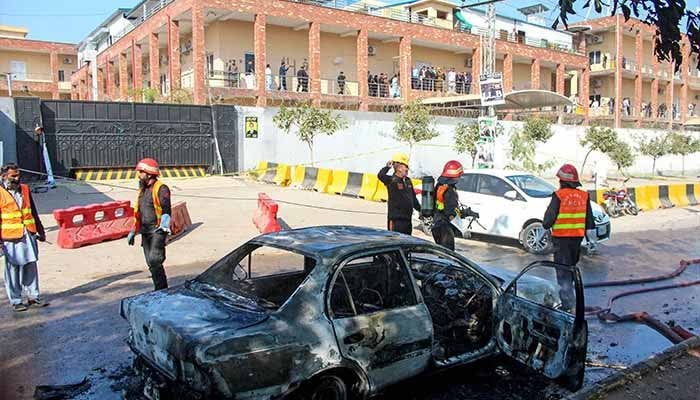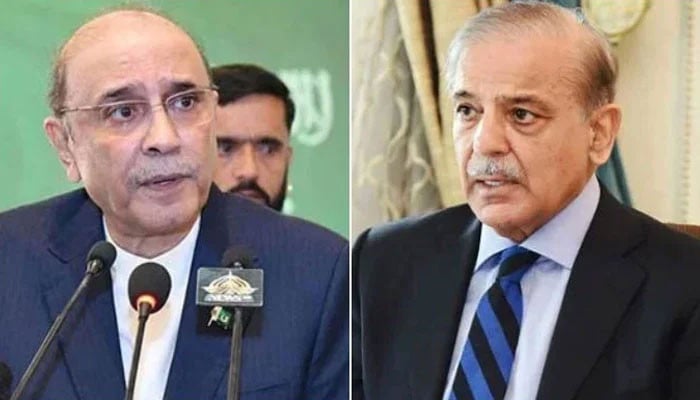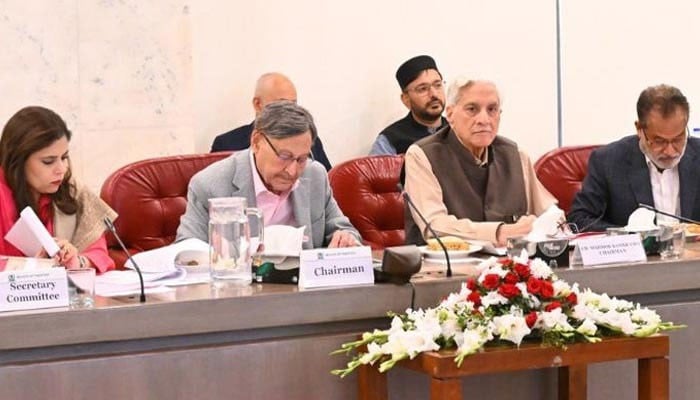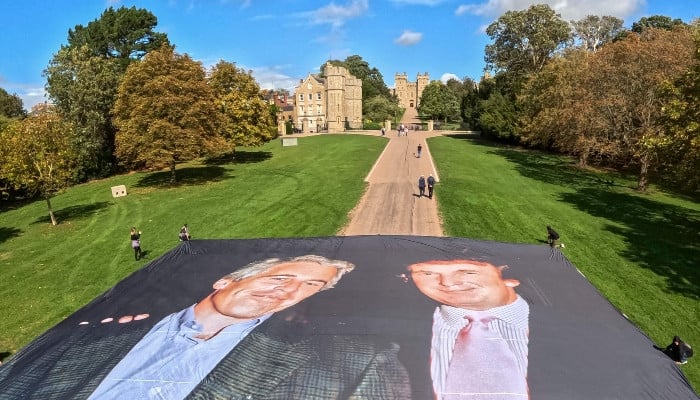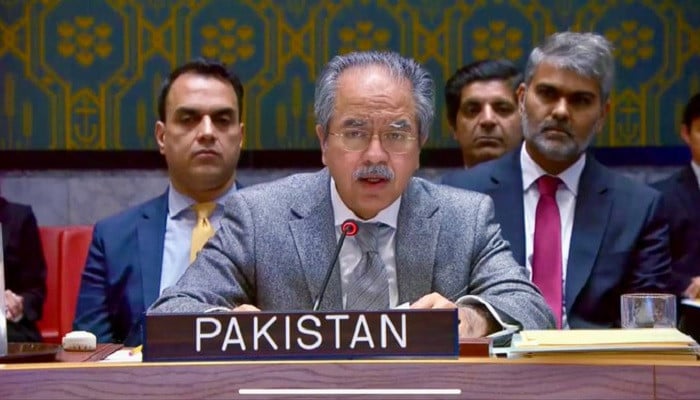
Pakistan's UN Ambassador Asim Iftikhar speaks during a UNSC session titled "UN Security Council Open Debate on Small Arms on November 10, 2025. — X@PakistanUN_NY
#Pakistan #alerts #world #dangers #Afghan #arms #terrorist #hands
Pakistan warned the United Nations on Monday that the unchecked flow of advanced weapons to Afghanistan-based terrorist groups poses a direct and growing threat to regional security, at a time when relations with Kabul are already under strain.
Pakistan’s Permanent Representative to the United Nations, Ambassador Asim Iftikar Ahmed, raised the issue during an open debate on small arms at the United Nations Security Council, stressing that Islamabad is deeply concerned about developments in Afghanistan.
“Pakistan is seriously concerned about the presence of sophisticated weapons and ammunition stockpiles in Afghanistan, as indicated in the findings of the Secretary General’s reports,” the ambassador told the members in attendance.
“These sophisticated weapons pose a direct threat to neighboring countries.”
Pakistani and Afghan militants clashed last month, killing dozens, in the worst violence since Afghanistan returned to power in 2021.
The two sides signed a ceasefire in Doha in October, but talks in Istanbul ended without a long-term deal due to disagreements over militant groups hostile to Pakistan operating inside Afghanistan.
Pakistan has repeatedly shared its concerns regarding the presence of Fitna al-Khawarij and Fitna al-Hindistan operating from Afghan soil, and it expects concrete and verifiable actions by the Taliban government against these terrorist elements.
Referring to smuggling networks and local threats, Ahmed said, “We also have reliable information about attempts to smuggle these weapons to neighboring countries for terrorist activities.
“Weapons seized along the Pakistan-Afghanistan border have been traced to arms caches left behind by foreign forces in Afghanistan and illegal weapons sold in black markets in Afghanistan.
“The movement of unmarked or unregistered arms across the international border sustains non-state armed groups, terrorist networks and criminal groups and undermines regional security and stability,” he said.
Ambassador Ahmed also elaborated on the impact on Pakistan, “We are also deeply concerned about the acquisition and use of advanced and powerful weapons, mostly abandoned, by terrorist groups based in Afghanistan, which pose a serious challenge to peace and security in Pakistan and the wider region.”
Highlighting the specific groups responsible for the attacks, Pakistan’s UN envoy said that Daesh works with the KK, TTP (Tehrik-Taliban Pakistan), Fandana al-Kharj – a UN-listed terrorist organization, and terrorist organizations, Fazna al-Kharj, and the Majid Brigades, which are supported by the Balochistan Liberation Army and work with Majid Brigades. Actors in the region, “have used these weapons against Pakistani civilians and law enforcement agencies causing the loss of thousands of innocent lives.”
We call for strong international efforts to prevent the access of illegal weapons to armed terrorist groups in Afghanistan and to ensure that the Afghan transitional authorities adhere to their international obligations and commitments in this regard, he said.
“The international community needs to step up its efforts to effectively address international and regional peace and security and widen the gap in its response,” he said, urging international action.
Ambassador Ahmed outlined the wider dangers of illegal arms proliferation.
“The illicit transfer and unchecked use of small arms and light weapons, including their destabilizing accumulation, has a direct impact on intensifying and prolonging conflicts, endangering social and economic development, and undermining prospects for peace and security, particularly at the regional and sub-regional levels,” he said.
“Small arms and light weapons are neither small nor light,” he stressed, in terms of their impact on local communities, on the humanitarian and social impacts.
“Illicit weapons impede development prospects, violate human rights and undermine peace, security and stability.”
Referring to statistics on global terrorism, he added, “According to empirical data, small arms are the second most used weapon in global terrorist attacks after explosives.”
Focusing on Africa, Ambassador Ahmed highlighted the vulnerability of the region. “As highlighted by the Secretary-General’s report, Africa is one of the regions most severely affected by the illicit trade, misuse and diversion of small arms and light weapons.
“Illegal weapons have fueled conflict, exacerbated internal security threats, served as tools for terrorism, organized crime, political violence, and the erosion of the rule of law – thus emerging as one of the most important drivers of instability on the African continent.”
He warned of the increasing use of these weapons by non-state actors. “Small arms and light weapons have also emerged as the tools of choice for non-state actors to end violence.
“These concerns are exacerbated by the increasing sophistication of illegal weapons and the access of advanced weapons to illegal armed groups that often operate across national borders.
“Illegal arms, thus, directly threaten national security, hampering counter-terrorism operations and civilian security,” he said.
The envoy also addressed modern challenges in proliferation.
“The evolving nature of warfare and the advent of new technologies present serious challenges in countering the proliferation of increasingly lethal small arms, such as unmanned aerial vehicles, AI-based weapons, 3D printed small arms, and high-tech night vision devices.
“Criminal groups and terrorists are increasingly using technologies like cryptocurrencies for anonymous transactions and employ the dark web to avoid detection when acquiring such weapons,” he said.
Pointing to the solution, Ambassador Ahmed added, “While new technologies have introduced new challenges in the production and proliferation of illicit arms manufacturing, they have also opened up new avenues for effective control and international cooperation, which need to be fully exploited.
“Traditional arms control measures, designed for another era before the advent of these new technologies, must keep pace with new developments.”
“We strongly believe that the issue of illegal small arms and light weapons should be addressed in a comprehensive and balanced manner.
“The United Nations Program of Action on the Illicit Trade in Small Arms and Light Weapons in all its aspects strikes a balance between the legitimate security needs of States and the imperative to address the issue of illicit arms from both the supply and demand sides.
“We are committed to its implementation at the national level and demand its full implementation at the global level to protect and promote international and regional peace and security.”
